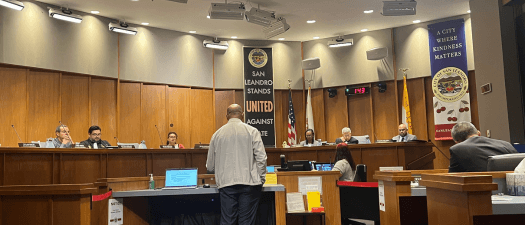San Leandro Rental Owners Subject to Bait & Switch at City Council Work Session

Last night’s San Leandro City Council work session on the proposed Rent Stabilization Program stretched late into the night, as city staff presented their latest updates to the draft program. The presentation reflected months of community outreach and incorporated revisions based on feedback received from both rental housing providers and renters.
Roughly 90% of public speakers last night were rental housing providers, many expressing concern about the ordinance and its potential impact on San Leandro’s rental market and housing growth. History tells us that extreme rent control has never been good for rental housing and new housing development, but the proposed San Leandro ordinance was shaping up to be a moderate approach.
The program presented to the community outlined several items, but the most impactful elements included:
- Flat 5% annual rent increase cap that is NOT attached to CPI (Consumer Price Index)
- Pass-through program to renters for capital improvements
- Exemption from the program for small "mom & pop" rental owners
You can see the entire program outlined HERE
HOWEVER, rental owners were subject to a bait and switch after public comment, when council members shared their own views on what they want the rent stabilization program to include. Their comments reflected a much more restrictive approach than what city staff has been presenting publicly. Several council members supported policies that would make San Leandro’s ordinance among the most extreme in Alameda County.
Here’s a summary of where council members stand:
- Councilmember Viveros – Supports a 3% annual rent increase cap or 65% CPI (whichever is lower), not supportive of any exemptions for small owners, opposed to means testing.
- Councilmember Aguilar – Supports a 3.5% annual rent increase cap or 65% CPI (whichever is lower), would exempt owner-occupied duplexes, and opposes banking of rent increases.
- Councilmember Simon – Opposes pass-throughs and banking, supports 3.5% cap or 65% CPI, and no exemptions for small owners.
- Councilmember Bolt – Called this a “moral decision” rather than basing it on rational economics. He wanted a 2% cap, but was willing to do a 3% cap or 65% CPI, and wants to eliminate small owner exclusions, no banking, and no means testing.
- Councilmember Azevedo – Supports a 3.5% cap or 65% CPI, opposed to pass-throughs, and expressed interest in means testing if others supported it.
- Councilmember Bowen – She was more on the fence and asked key questions about “what problem we are trying to solve.” She acknowledged instability in the current market and noted that rent control could lead to automatic annual rent increases. Bowen leaned toward a 3.75% cap, supports banking, wants exemptions for small owners, and suggested a review of the program in 3 years to see if it's actually working.
Finally, when Mayor Juan Gonzalez spoke, he voiced clear frustration with the council’s direction. The Mayor emphasized that the council’s current proposals would undermine housing growth and repeat the classic problems seen in other rent-controlled cities — such as deferred maintenance and reduced investment in housing.
Mayor Gonzalez had proposed at the onset of this rent stabilization program a 5% flat annual cap, calling it a reasonable compromise since it already represents a 50% reduction from the state’s 10% limit under AB 1482. He warned that pushing caps as low as 3% would squeeze housing providers and lead to an increase in fair return petitions, overburdening city staff and adding costs to the program.
The Mayor also expressed concern about the projected $1.6 million annual cost of administering the rent stabilization program — a figure likely to rise over time — and questioned the council’s lack of support for banking and pass-throughs, which are common features in neighboring cities. He reminded the council that the City of Alameda’s rent program (often referenced as a model) allows 5% annual increases, banking, and pass-throughs, yet those points were being ignored in last night’s discussion.
In closing, Mayor Gonzalez urged the council to slow down the process and make data-driven decisions rather than adopting arbitrary limits.
EBRHA will continue to work with San Leandro Council members and advocate for more moderate and balanced policies that protect renters while ensuring the city’s housing stock remains safe, well-maintained, and financially sustainable for local housing providers.
The next scheduled work session to review the ordinance with the council's new direction is scheduled for November 10th.
